Hadith No. 11 –The Path to Tranquility: Avoiding Doubtful Matters
عَنْ أبي مُحَمَّدٍ الْحَسَنِ بْنِ عَلِيِّ بْنِ أَبِي طَالِبٍ رضي الله عنهما سِبْطِ رَسُولِ اللَّهَ صلى الله عليه وسلم وَرَيْحَانَتِهِ قَالَ: حَفِظْتُ مِنْ رَسُولِ اللَّهِ صلى الله عليه وسلم: "دَعْ مَا يَرِيبُكَ إِلَى مَا لَا يَرِيبُكَ" رَوَاهُ التِّرْمِذِيُّ وَالنَّسَائيُّ، وَقَالَ التِّرْمِذِيُّ: حَدِيثٌ حَسَنٌ صَحِيحٌ
Translation:
On the authority of Abū Muḥammad al-Ḥasan ibn ʿAlī ibn Abī Ṭālib رضي الله عنهما, the grandson of the Messenger of Allah ﷺ and his fragrant flower, who said:
"I memorised from the Messenger of Allah ﷺ: Leave that which makes you doubt for that which does not make you doubt."
Narrated by al-Tirmidhī and al-Nasāʾī; al-Tirmidhī said: It is a ḥasan ṣaḥīḥ ḥadīth.
This hadith is short but immensely comprehensive — it is a principle of waraʿ (scrupulousness) and iḥtiyāṭ (precaution) in matters of faith, ethics, and worldly dealings. It directs the believer to choose certainty over doubt in actions, words, and decisions, thereby protecting both dīn and ʿird (religion and honour).
Biography of the Narrator – Abū Muḥammad al-Ḥasan ibn ʿAlī ibn Abī Ṭālib رضي الله عنهما
He is Abū Muḥammad al-Ḥasan ibn ʿAlī ibn Abī Ṭālib, the grandson (sibt) of the Messenger of Allah ﷺ and his fragrant flower (rayḥānah). He is the son of Amīr al-Muʾminīn ʿAlī ibn Abī Ṭālib, cousin of the Prophet ﷺ, and Fāṭimah al-Zahrāʾ, the daughter of the Messenger of Allah ﷺ and the leader of the women of the worlds. The Prophet ﷺ honoured him with the title “Sayyid Shabāb Ahl al-Jannah” (leader of the youth of Paradise). He was born in mid-Ramadan, 3 AH (some say Shaʿbān of the same year). When he was born, ʿAlī رضي الله عنه named him Ḥarb, but the Prophet ﷺ asked, “Show me my son; what have you named him?” When told Ḥarb, he replied, “No, rather he is Ḥasan.” The same happened with his brother al-Ḥusayn, whom the Prophet ﷺ named himself.
The Prophet ﷺ loved al-Ḥasan deeply, saying:
- “Whoever loves al-Ḥasan and al-Ḥusayn has loved me, and whoever hates them has hated me.”[1]
- “Al-Ḥasan and al-Ḥusayn are the leaders of the youth of Paradise.”[2]
- Pointing to him during a sermon, the Prophet ﷺ said: “Indeed, this son of mine is a leader, and perhaps Allah will reconcile through him between two great factions of the Muslims.”[3]
Al-Ḥasan was also known for his striking resemblance to the Prophet ﷺ, especially in his facial features.
He was raised in the household of prophethood, learning directly from his grandfather ﷺ and his parents. Under the guidance of his father, he mastered Qurʾān, Sunnah, and the methods of deriving legal rulings — including applying the apparent meaning of the Qurʾān, reconciling the general with the specific, understanding abrogation (naskh), and grasping the context and language of revelation. He narrated from his father ʿAlī, ʿUthmān ibn ʿAffān, ʿAbd Allāh ibn Masʿūd, and others. Great scholars such as ʿĀṣim and ʿAṭāʾ learned Qurʾānic recitation from him.
After the martyrdom of his father in 40 AH, al-Ḥasan became the rightful caliph. His tenure lasted six months, completing the thirty years of rightly-guided caliphate foretold by the Prophet ﷺ. Fulfilling the prophecy, he chose to relinquish leadership to Muʿāwiyah رضي الله عنه to prevent bloodshed and unite the Muslims, an act remembered as the Year of Unity (ʿĀm al-Jamāʿah). Thus the prophecy of the Prophet ﷺ “perhaps Allah will reconcile through him between two great factions of the Muslims” was realized. Then he returned to Madina from Kufa to spend his rest of life.
Al-Ḥasan was known for his generosity, dignity, patience, and commitment to unity. His choice to step down from power reflected the prophetic principle of preferring the welfare of the Ummah over personal claims.
He was poisoned in Madinah in 49 AH (some say 50, 51, or 58 AH), reportedly through a plot involving one of his wives, instigated by Yazīd ibn Muʿāwiyah[4]. He was buried in al-Baqīʿ cemetery in Madinah, where his grave remains known to this day.
While narrating this hadith, Imām al-Nawawī describes him as “the fragrant flower (rayḥānah) of the Messenger of Allah ﷺ”, a title the Prophet ﷺ himself used for him and his brother al-Ḥusayn. The word rayḥānah refers to an aromatic plant, its fragrance bringing delight and comfort to the soul, a fitting metaphor for the joy and tenderness the Prophet ﷺ felt in their presence. It can also be taken literally, recalling moments when the Prophet ﷺ would embrace and smell them out of pure affection.
Al-Ḥasan was about seven years old when the Prophet ﷺ passed. Because of this short period, his narrations are few, and he carefully phrased this report by saying ḥafiztu (“I memorised”), indicating the reliability of his retention despite his young age. This hadith, preserved through authentic chains in al-Tirmidhī and al-Nasāʾī, contains a concise yet profound principle that forms a foundation of piety and moral caution in Islam.
Explanation of the Hadith
The Prophet ﷺ laid down a clear principle for anyone seeking purity of faith and peace of heart: “Leave what makes you doubt for what does not make you doubt.” This means distancing oneself from doubtful matters and holding firmly to what is certain, thereby safeguarding both one’s religion and reputation, and attaining ṭumaʾnīnah (tranquillity) of the heart. This path is the way of waraʿ, refraining from what is doubtful and from anything that leads to the forbidden. Some scholars have defined it as “leaving what there is no harm in, out of fear of what there is harm in.” or “abandoning the permissible lest it lead to the impermissible.” For example, avoiding dealings with a person whose wealth is a mixture of halal and haram, or abstaining from food suspected of containing prohibited ingredients such as alcohol or pork.
The Prophet’s instruction is one of caution and refinement. The term “mā yarībuka” refers to what instils suspicion or doubt. The believer is urged to move from the realm of uncertainty to the realm of clear, lawful certainty, “to what does not make you doubt.” The Prophet’s ﷺ command is an invitation to move away from doubtful matters toward what is clear and unquestionably lawful. This echoes his ﷺ earlier teaching in Ḥadīth Six that “Whoever avoids the doubtful has safeguarded his religion and his honour.” Both narrations converge on one essential principle, avoiding the grey areas that may lead to moral or legal compromise.
As he ﷺ also said in another narration, “A servant will not reach the rank of the truly God-conscious until he leaves what there is no harm in, fearing what there is harm in.”[5] Abū Dharr رضي الله عنه expressed it plainly: “Perfect taqwā is leaving some of the halal out of fear that it may be haram.”[6].
Scholars have noted[7] that some doubtful matters are so severe (shubha muḥaqqaqa fāḥisha) that they must be treated as outright prohibited, while lesser doubts may not carry the same ruling but are still better avoided for the sake of waraʿ. For example, the sale of ʿīnah is considered by many to be a trick (ḥīlah) to disguise ribā; some jurists see it as outright unlawful, others as technically permissible yet morally questionable. Even if one’s intention in engaging in such a transaction is free from deceit, and Allah knows the sincerity of the heart, the person has still not safeguarded his religion or his honour because suspicion will surround him. Thus, the prophetic guidance is clear — push away what troubles the conscience and inclines toward the forbidden, and choose instead what is free from doubt.
Scholars define it in varying degrees:
- Leaving the doubtful – as in the hadith itself, avoiding that which causes suspicion to protect oneself from haram.
- Leaving what is permissible out of fear it may lead to harm or disobedience.
- Leaving some of the ḥalāl out of spiritual caution, as in the saying:
- Complete waraʿ – abstaining even from matters that could lower one’s spiritual rank, even if entirely permissible.
Some Examples of Early Generations
From the waraʿ of the Prophet ﷺ is his own statement:
“I return to my family and find a date that has fallen on my bed. I pick it up to eat it, then I fear that it might be charity, so I leave it.”[8]
This shows the absolute prohibition of charity for the Prophet ﷺ, whether obligatory or voluntary, due to the generality of the ruling. Al-Mahallab explained that his leaving it was out of scrupulous caution, not obligation, since the default is that everything found in one’s own home is permissible.
The lives of the righteous are filled with similar examples. The Prophet ﷺ told the story of a man who purchased a piece of land and later discovered a jar of gold within it. He went to the seller and said, “Take your gold, for I only bought the land, not the gold.” The seller replied, “I sold you the land and everything in it.” Unable to agree, they brought the matter to a wise judge, who asked each if they had children. One said, “I have a son,” and the other said, “I have a daughter.” The judge told them, “Marry the boy to the girl, spend on yourselves from the gold, and give some in charity.”[9]
Many of the righteous lived by this teaching with remarkable resolve. Yazīd ibn Zurayʿ, for example, refused an inheritance of five hundred thousand from his father because his father had worked in official posts for rulers, and Yazīd feared that the income might be tainted. Instead, he earned his livelihood weaving palm leaves until his death.
Such stories invite us to measure ourselves: if we found wealth hidden in something we bought, would we rush to claim it, or would we, like these men, seek to act with integrity and caution? This is the essence of waraʿ, prioritising what is pure and doubt-free over what is tainted by even the smallest suspicion.
Al-Fuḍayl ibn ʿIyāḍ once said, “People claim that waraʿ is difficult, but whenever two matters come before me, I take the more cautious of the two. So, leave what makes you doubt for what does not make you doubt.” Ḥassān ibn Abī Sinān put it even more simply: “There is nothing easier than waraʿ — if something troubles you, then leave it.” When ʿĀʾishah رضي الله عنها was asked about eating game while in the state of iḥrām, she replied, “It is only a few days; whatever causes you doubt, leave it.”[10]
It is not hard to find modern examples. The Muslim who avoids a meal because he is unsure of its ingredients, the trader who declines a contract that could be a disguised form of ribā, the employee who refuses income from questionable sources, all of them live this hadith in spirit.
Misapplied Waraʿ
The scholars like Ibn Hajr al-Haytami have noted[11], however, that caution from doubtful matters should not be misapplied. What the Prophet ﷺ permitted without any opposing evidence should be acted upon rather than avoided, even if some have prohibited it due to lack of knowledge or weak reasoning. For example, one who is certain of being in a state of purity should not leave prayer merely because of an unfounded doubt, as the Prophet ﷺ instructed, “He should not leave until he hears a sound or smells an odour.”[12]
Thus, meticulous avoidance of doubtful matters truly benefits those whose lives are already marked by uprightness. For the one immersed in major sins, avoiding tiny doubtful points while neglecting the greater wrongs is misplaced effort.
As Ibn ʿUmar رضي الله عنهما remarked to a questioner from Iraq, “They ask me about the blood of mosquitoes, yet they killed al-Ḥusayn!” Likewise, Imām Aḥmad, when asked by a man if he could write from his inkwell, replied, “Write, this is an extreme kind of waraʿ.” To another, he said, “Neither your waraʿ nor mine will reach this level.”[13]
To conclude, true peace resides in the cautious heart. The Prophet ﷺ taught, “Truthfulness brings tranquillity, and falsehood brings doubt.” A believer’s heart recognises this instinctively, when it is at rest, it is a sign of goodness; when uneasy, it is a warning to pause. In one narration, though with a weak chain from Abū Hurayrah رضي الله عنه, a man asked, “How will I know the difference between what to leave and what to take?” The Prophet ﷺ replied:
“When you intend a matter, place your hand upon your chest; for the heart trembles for what is ḥarām and is at ease with what is ḥalāl. And the scrupulous Muslim leaves the small sins for fear of falling into the major ones.”[14]
In the addition reported by al-Ṭabarānī, when asked, “Who is the person of waraʿ?” he ﷺ answered:
“The one who stops at the doubtful matter.”
Thus, the purified and alert heart becomes the believer’s inner compass, a God-given measure to distinguish between what is safe to pursue and what is best left behind.
May Allah bless us with a purified heart and resolve to abstain from doubtful matters.
References:
[1] Aḥmad 7876 and Ibn Mājah 143
[2] Sunan al-Tirmidhī (Hadith 3768), Musnad Aḥmad (11636)
[3] Ṣaḥīḥ al‑Bukhārī (Hadith 2704)
[4] Ibn Ḥajar al-Haytamī, Al-Fatḥ al-Mubīn fī Sharḥ al-Arbaʿīn P. 294
[5] Narrated by al-Tirmidhī (no. 2451) and Ibn Mājah (no. 4215)
[6] al-Ḥāfiẓ al-Suyūṭī in al-Durr al-Manthūr (1/61) and al-Ḥāfiẓ Ibn Ḥajar in Fatḥ al-Bārī (1/48) with similar wording.
[7] Ibn Ḥajar al-Haytamī, Al-Fatḥ al-Mubīn fī Sharḥ al-Arbaʿīn P. 295
[8] Narrated by al-Bukhārī, Hadith no. 2432
[9] Narrated by al-Bukhārī, Hadith no. 3472
[10] Ibn Ḥajar al-Haytamī, Al-Fatḥ al-Mubīn fī Sharḥ al-Arbaʿīn P. 297
[11] Ibn Ḥajar al-Haytamī, Al-Fatḥ al-Mubīn fī Sharḥ al-Arbaʿīn P. 298
[12] Ṣaḥīḥ al-Bukhārī (no. 137) and Ṣaḥīḥ Muslim (no. 361)
[13] al-Samʿānī in Adab al-Imlāʾ wa al-Istimlāʾ (p. 156)
[14] al-Muʿjam al-Kabīr (22/78)
More related articles
The Essence of Religion – Sincerity (Naṣīḥah) in Spiritual and Social Relations
Hadith No. 5: Innovation in Religion and Its Parameters
Breathing of Soul and Allah’s Decree of Rizq, Ajal, ʿAmal, and Final Destiny
Disclaimer
The views expressed in this article are the author’s own and do not necessarily mirror Islamonweb’s editorial stance.

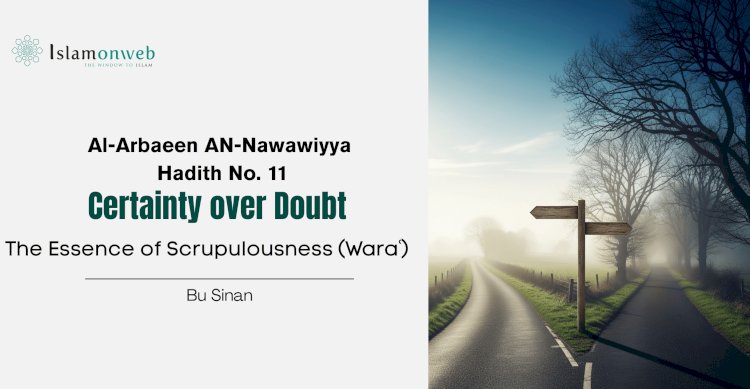


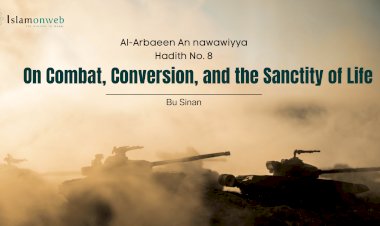

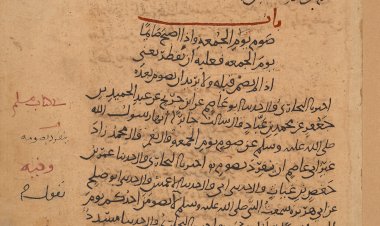
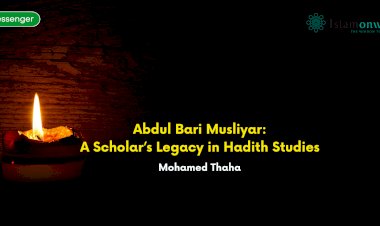
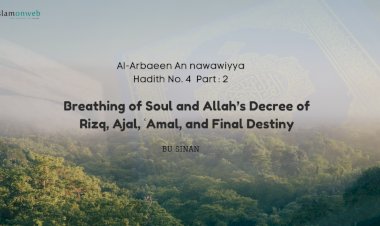
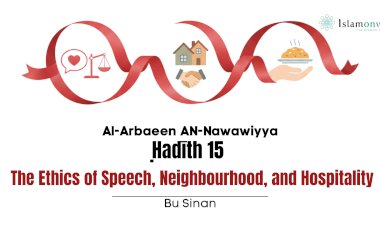














Leave A Comment